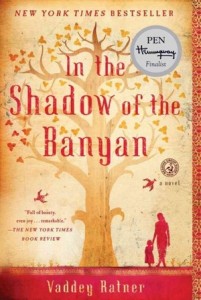In the Shadow of the Banyan was the selection for my Book Club’s July meeting.
 In the Shadow of the Banyan: A Novel
In the Shadow of the Banyan: A Novel
by Vaddey Ratner, Historical Fiction (Released August, 2012)
Bottom Line: Skip it.
Summary: Seven year old Raami and her family face the horrors of the Khmer Rouge’s occupation of Cambodia in the late 1970’s.
My Thoughts: As you can probably guess by the summary, this is a serious book. It’s based on the author and her family’s real experience as minor royals during the Cambodian occupation, including being forced to leave their home in Phnom Penh by Khmer Rouge soldiers, to labor in the rice fields, and to separate from extended family members. I had a very hard time getting into this book. Though the second half is better than the first, it still didn’t really make an impression on me. The beginning of the book focuses on Raami’s family life as Cambodian royals – talking lots about their lifestyle, food, customs, and storytelling. It did a pretty mediocre job of setting the stage for the occupation as the predominant theme of the book and I was somewhat confused about what the war/occupation was truly about. The occupation is also initially described almost as a list of different atrocities the family witnesses out of a car window. The atrocities are described in such little detail that I didn’t have a chance to get emotionally involved or feel too deeply. The characters in the first part of the book (mostly family members and their servants) also failed to touch me emotionally…they felt like no more than names with designated roles to me, with no real personalities. Finally, there is a huge focus on legend-like stories and “tevodas” (godlike mythical beings) that Raami’s dad passes down to her, but I found them confusing and irrelevant to the real story of the family’s experience during the occupation. The second half of the book is better – it focuses more on the occupation and less on the family and its storytelling. Even so, the second half still didn’t come alive for me emotionally like many of the other war/occupation books I’ve read. All this being said, I really liked the Author’s Note at the end of the book about her real experience…it was better than the actual book! It clearly outlined what the Khmer Rouge occupation was truly about and made me actually feel the severity of the situation, something the actual book never really accomplished. Ratner probably should have made it a Prologue instead – it would have set the stage for the story and fixed the problem of wondering what the heck you were reading about in the beginning. Or, taking it a step further, maybe she should have just written a straight-up memoir! This is clearly a book that is suppose to move the reader and touch him/her emotionally and it just completely failed to do that for me, although I do appreciate what Ratner went through as a child.
